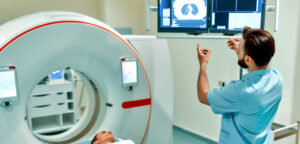MRI
Magnetic resonance imaging (MRI) is a type of medical imaging that uses a magnetic field and computer-generated radio waves to create detailed three-dimensional images of the internal organs and tissues of the body. It is a non-invasive way commonly used to diagnose different medical conditions, such as cancer, heart disease, stroke, and other medical problems.
Before undergoing an MRI scan, a patient is advised to remove any jewelry or metal objects and wear comfortable clothing. Then, the patient is placed on a table to lie down and inserted into the MRI scanner. During the scan, the patient must remain still till the end of the procedure, which can take up to an hour. After the scan is complete, the patient can leave the scanner, and the cross-sectional image results will be sent to a radiologist for interpretation.
Advanced MRI
Advanced MRI is a type of medical imaging that uses powerful magnets and radio waves to create detailed three-dimensional images of the body’s internal organs, tissues, and skeletal structures. Advanced MRI produces high-resolution images of the inside body that help diagnose multiple health conditions. Advanced MRI scans are usually more detailed and accurate than standard MRI scans and can provide more information about a patient’s condition. This type of scan is usually painless, non-invasive, and usually takes between 30 and 60 minutes to complete.
A 1.5 tesla MRI machine is a medical imaging device that uses a powerful magnetic field and radio waves to create detailed three-dimensional images of the body’s internal organs, tissues, and structures. A 1.5T MRI machine is 30,000 times stronger than the earth’s magnetic field. This machine detects and helps diagnose multiple medical conditions, such as cancer, heart disease, stroke, and other medical problems. 1.5 tesla MRI machines are usually more powerful than standard MRI machines and can provide more detailed, accurate, and high-resolution images. It is painless, non-invasive, and usually takes between 30 and 60 minutes to complete.
Breast Magnetic Resonance Imaging (MRI)
Breast MRIs are used to assess the severity of breast cancer. It also helps to screen women at higher risk for breast cancer. A doctor recommends a breast MRI to know the extent of cancer in the breast during the treatment
MRI can be a valuable diagnostic tool, combined with mammography and breast ultrasound. Recent research has discovered that MRI can detect some small breast lesions that mammography misses. It can also aid in detecting breast cancer in women with breast implants and younger women with dense breast tissue.
3D Mammography
Mammography (digital breast tomosynthesis) is specialized medical imaging that uses a low-dose x-ray system to examine the inside of the breasts. A mammography exam, also known as a mammogram, helps women detect and diagnose breast diseases early.
A doctor recommends a biopsy if a mammogram, ultrasound, or MRI reveals a suspicious area in the image findings or if there is a concerning clinical finding. A biopsy is not required if the scan is normal and if there are no concerning symptoms.
The most vital benefit of 3-D mammography is its increased accuracy. Sometimes we biopsy other common areas because they don’t look normal, but 3-D imaging allows us to see subtle changes in the breast and reduces the number of false positive biopsies.
Types of MRI:
- Abdominal MRI
- Brain MRI
- Cardiac MRI
- Knee MRI
- Pelvic MRI
- Spinal MRI
- Extremity MRI
- Breast MRI
The Common Uses of an MRI Scan
The doctors use MRI scans to diagnose health conditions and injuries including:
- Aneurysms of Cerebral Vessels
- Multiple Sclerosis (MS)
- Spinal Cord Disorders
- Eye and Inner Ear disorders
- Stroke
- Tumors of bones and soft tissues
- Brain Injury
- Bone infections
- Joint abnormalities like torn cartilage and ligaments
- Inflammation or blockages in the blood vessels
- Size and function of the heart’s chamber
- thickness and movement of the walls of the heart
- damage caused by heart attacks or heart diseases.
An MRI can check abnormalities in multiple areas of the body, including:
- Brain and spinal cord
- heart and blood vessels
- bones and joints
- breasts
- liver and bile ducts
- kidneys
- spleen
- pancreas
- uterus
- ovaries
- prostrate

Siu-Ka-Pha Multispeciality Hospital is well-equipped with modern technology including 1.5 Tesla MRI Scanner and a 3D Mammogram, world-class facilities, and Highly qualified doctors. We at Siu-Ka-Pha provide the best MRI scan services with less radiation exposure, which help our doctors and specialists to identify and diagnose the medical conditions of the inside body. We ensure quality healthcare services are accessible to all, considering the safety guidelines for patient comfort.
For more details, request an Appointment at Siu-ka-Pha Hospital!
FAQ's
An MRI scan is a non-invasive medical test that uses a magnetic field and radio waves to produce detailed images of the body’s internal structures. At Siu-Ka-Pha hospital in Assam, they have an advanced MRI scan.
An MRI scan is performed to diagnose and monitor a wide range of medical conditions, including tumors, injuries, infections, and degenerative disorders.
Yes, MRI scans are considered safe and non-invasive. However, patients with certain medical conditions, such as pacemakers, aneurysm clips, or cochlear implants, may not be able to undergo an MRI scan.
The duration of an MRI scan varies depending on the part of the body being imaged and the complexity of the exam. Most MRI scans take between 30 minutes and an hour.
No, an MRI scan is not painful. However, some patients may experience discomfort due to the noise and confinement of the MRI scanner.






















 Call Us
Call Us Book Appiontment
Book Appiontment